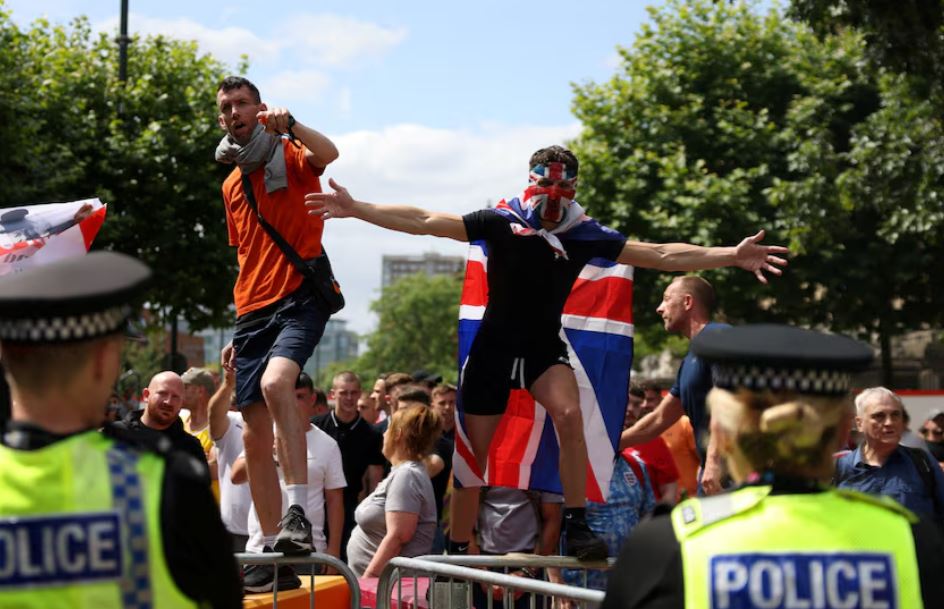Southport Violence: A Critical Test for Keir Starmer’s Leadership
In recent days, the quiet town of Southport in northwest England has been thrust into the national spotlight following one of the most horrifying attacks on children in Britain in nearly thirty years. A 17-year-old, wielding a knife, launched a brutal assault at a Taylor Swift-themed dance class, resulting in the tragic deaths of three young girls and severe injuries to five others. This incident, marked by its shocking brutality, has become more than a local tragedy; it has sparked a wider national crisis exacerbated by the rapid spread of disinformation and a surge in far-right extremism.
The Explosion of Misinformation and its Fallout
The attack in Southport was quickly hijacked by the dark forces of online misinformation. Social media platforms, which often serve as conduits for both legitimate discourse and destructive conspiracy theories, were inundated with false claims about the suspect’s identity. The perpetrator was falsely identified as “Ali Al-Shakati,” a purported Muslim illegal immigrant purportedly on an MI6 watch list. This baseless narrative, designed to stoke fear and division, falsely portrayed the attack as part of a larger, nefarious plot involving ethnic minorities and terrorism.
Such disinformation not only misleads the public but also incites violence. Within hours of the attack, racist hooligans targeted a local mosque, resulting in violent clashes with police that left over fifty officers injured. The spread of false information continued to fuel unrest, leading to copycat violence in Hartlepool and beyond. The far-right English Defence League (EDL), led by notorious troublemaker Tommy Robinson, was quickly implicated in the ensuing chaos.
The Challenge for Keir Starmer and the Government’s Response
As Prime Minister, Keir Starmer faces a significant challenge in addressing the Southport violence and its aftermath. Known for his tenure as a Crown Prosecutor, Starmer’s experience in confronting terrorism and organizing emergency responses is now put to the test. In response to the violence, Starmer announced the establishment of a new Violent Disorder Unit aimed at tracking and mitigating the activities of far-right extremists who roam from one community to another. Additionally, there are plans to impose movement restrictions on far-right individuals with criminal records, similar to measures used against soccer hooligans.
Despite these measures, the situation remains volatile. The EDL’s recent occupation of Trafalgar Square, spurred by a previous terrorist attack by a Muslim assailant, highlights the precarious nature of the current climate. Far-right groups are capitalizing on left-wing pro-Palestine protests to further their agenda, making it imperative for the government to act decisively to prevent a prolonged period of unrest.
The Role of Social Media and Legislative Challenges
The role of social media in amplifying misinformation and extremism cannot be overstated. Platforms such as Twitter and Facebook have faced criticism for their permissive stance on hate speech and misinformation. The recent readmission of Tommy Robinson to Twitter/X and the reduction in monitoring teams by Facebook reflect a troubling trend towards leniency in handling inflammatory content.
In response to these challenges, there is a growing call for more stringent regulation of social media platforms. The Online Safety Act, while introducing criminal penalties for spreading harmful misinformation, does not adequately address the removal of such content. Jonathan Hall, the government’s legal advisor on terrorism, advocates for legislation that mandates greater transparency from tech giants, urging a more proactive approach to combatting hostile foreign disinformation.
The Tory Opposition’s Response and Broader Implications
The Southport violence has also placed pressure on the Tory opposition. Nigel Farage, leader of the right-wing Reform party, used the tragedy to question why the attacks were not classified as “terror-related,” further fueling divisive rhetoric. Farage’s provocative statements have been criticized by figures such as Brendan Cox, who accused him of being no different from Tommy Robinson despite his polished public persona.
The situation poses a significant challenge for the Conservative Party as it contemplates merging with the Reform party. The need for a unified and coherent response to extremism is evident, but Farage’s recent actions underscore the complexities of navigating this volatile political landscape.
Conclusion: Navigating a Complex Crisis
The Southport violence represents a critical test for Keir Starmer and his government. The intertwined issues of misinformation, far-right extremism, and the limitations of current social media regulations necessitate a multifaceted response. Starmer’s leadership, combined with effective legislative measures and a robust approach to combating misinformation, will be crucial in steering the country through this turbulent period.
As the nation grapples with the consequences of this tragedy, it is imperative that both government and opposition demonstrate resolve and unity. The lessons learned from Southport will shape the approach to future crises, underscoring the importance of decisive action and effective communication in maintaining national cohesion and security.

Sunil Garnayak is an expert in Indian news with extensive knowledge of the nation’s political, social, and economic landscape and international relations. With years of experience in journalism, Sunil delivers in-depth analysis and accurate reporting that keeps readers informed about the latest developments in India. His commitment to factual accuracy and nuanced storytelling ensures that his articles provide valuable insights into the country’s most pressing issues.



